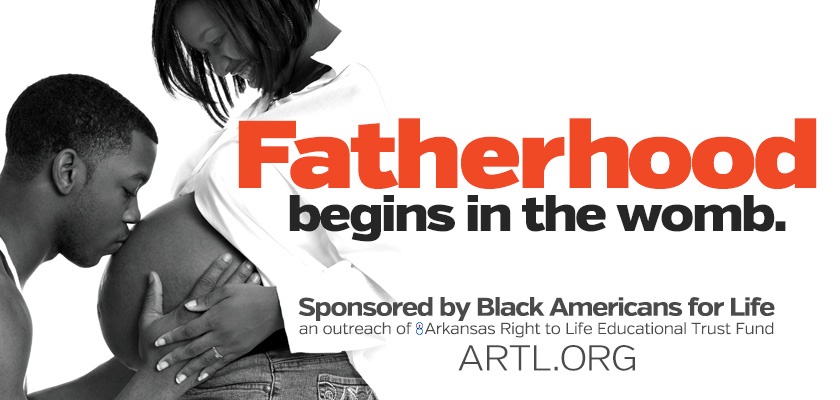The following is a press release from our friends at Arkansas Right to Life and Black Americans for Life.
June is “Abortion Awareness Month” in the African-American community and is being observed by the Arkansas chapter of Black Americans for Life, an outreach of Arkansas Right to Life. The group is sponsoring a billboard campaign that celebrates fatherhood and Abortion Awareness Month with the positive message that “Fatherhood Begins in the Womb.” The artwork was produced by Ryan Bomberger of the Radiance Foundation and creator of TooManyAborted.com.
The billboard campaign will feature two digital boards in Little Rock, located at 12th and University Avenue and Baseline Road at I-30, and posters on E. Harding in Pine Bluff and on E. Broadway in North Little Rock.
“Abortion disproportionately affects black women more than any other group. In 2014 approximately the same number of white and black unborn babies were killed by legal abortion every month in Arkansas, even though Blacks account for 15% of the population compared to 77% white. Most blacks should find this shocking. Unfortunately, many of us still do not even know,” stated Princella Smith, member of BAL. “It is disturbing that while the total number of abortions decline, the number of black abortions are increasing.”
The Arkansas chapter of Black Americans for Life works to expose the history of racism and eugenics that defined the birth control movement and legalized abortion, which resulted in the organization now known as Planned Parenthood. TooManyAborted.com educates the public about abortion’s impact on the black community via accurate and documented statistics, historical perspectives, thought-provoking videos, and personal testimonies.
The “Fatherhood Begins in the Womb” campaign strongly encourages all fathers to support the mothers of their children by welcoming and embracing the rewarding role of fatherhood when faced with unplanned pregnancy. For more visit: www.toomanyaborted.com/fatherhood-begins-in-the-womb/ Arkansas Right to Life is a non-profit public service organization. Our primary purpose is to educate through the presentation of detailed and factual information about fetal development, abortion, alternatives to abortion, infanticide, euthanasia, and related issues upon which individuals and the general public may make informed decisions.
Arkansas Right to Life is the oldest and largest pro-life organization in Arkansas and the state affiliate of the National Right to Life Committee.
###
READ MORE
 According to a study published earlier this year, marijuana tourism in Colorado–that is, people travelling to Colorado to use marijuana–is leading to more emergency room visits in the state.
According to a study published earlier this year, marijuana tourism in Colorado–that is, people travelling to Colorado to use marijuana–is leading to more emergency room visits in the state.



 News outlets in Arizona
News outlets in Arizona